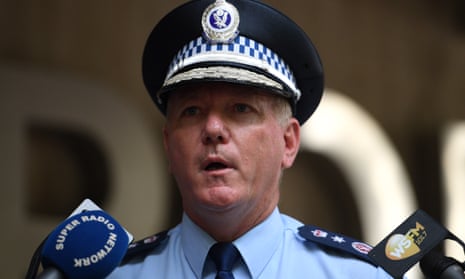The New South Wales police commissioner, Mick Fuller, has been accused of being “shrill and misleading” after he claimed reducing strip-searches could lead to an increase in knife crime despite less than 1% of all searches in the state being conducted for that reason.
Following a NSW coroner’s recommendation that police limit the use of strip-search powers at music festivals to cases of suspected drug supply, Fuller claimed in an interview with the Sydney tabloid newspaper the Daily Telegraph on Monday that a reduction in the use of the controversial power could lead to increased knife crime.
Comparing NSW to London, where the use of stop and search powers and knife crime is a major law and order issue, Fuller told the Telegraph young people should have “a little bit of fear” of police and said questioning “the legitimacy of policing” had “a negative impact on public safety”.
Fuller claimed knife crime in the UK had gone “through the roof” after police scaled back the use of stop and search powers in 2014 – a broader power not necessarily the same as a strip-search – and “isn’t taking over Sydney” because of the use of strip-searches.
But data shows NSW police rarely search people they suspect of being in possession of a knife or weapon.
Of the more than 20,000 searches conducted by police in the period between 2015-16 and 2018-19, less than 1% were done on the basis of a suspicion the person was in possession of a knife or other weapon.
Instead, the vast majority were based on the suspicion the person was in possession of illegal drugs. In the 2018-19 financial year, 91% of strip searches were conducted for that reason.
The data was first published in a report commissioned by the Redfern Legal Centre and conducted by University of New South Wales law academics Michael Grewcock and Vicki Sentas.
Using NSW police data, the report also found that knife offences accounted for less than 1.5 % of charges resulting from strip-searches in the period between 2016 and 2019.
Grewcock told Guardian Australia advocates for reform of strip-search powers had never called for police not to be able to search people suspected of carrying weapons.
“The point is that this is not an argument about strip-searching for weapons. When police are strip-searching 16-year-old girls at Splendour in the Grass in ways that are plainly quite abusive this has nothing to do with weapons,” he said.
“Police aren’t looking for knives when they’re strip-searching people at music festivals.
“This is the concern raised by us, the Redfern Legal Centre, people like [Greens MP] David Shoebridge and others: that, particularly with the use of drug dogs, strip-searches are being used to police small quantities of drugs and we’re saying that should stop.
“I think it’s quite a shrill and misleading response from the police commissioner.”
Samantha Lee, the Redfern Legal Centre’s police powers solicitor, agreed, saying advocates wanted police to target things like weapon possession.
“This is precisely what RLC is calling for, that strip-searches be limited to serious offences such as weapon offences and drug supply,” she said.
Last week the NSW deputy coroner, Harriet Grahame, released findings of an inquest into six deaths at music festivals in NSW. Besides recommending a pill-testing trial and the scrapping of drug dogs at festivals, Grahame also said strip-searches should be dramatically curtailed to only being used in cases of suspected supply.
The “wholesale practice of strip-searching young people” was of “grave concern”, Grahame said.
The NSW police have reacted strongly to the report. In her findings, Grahame revealed the commissioner had attempted to stop her considering strip-searches as part of the inquest, and following its release Fuller personally said he opposed pill testing.
